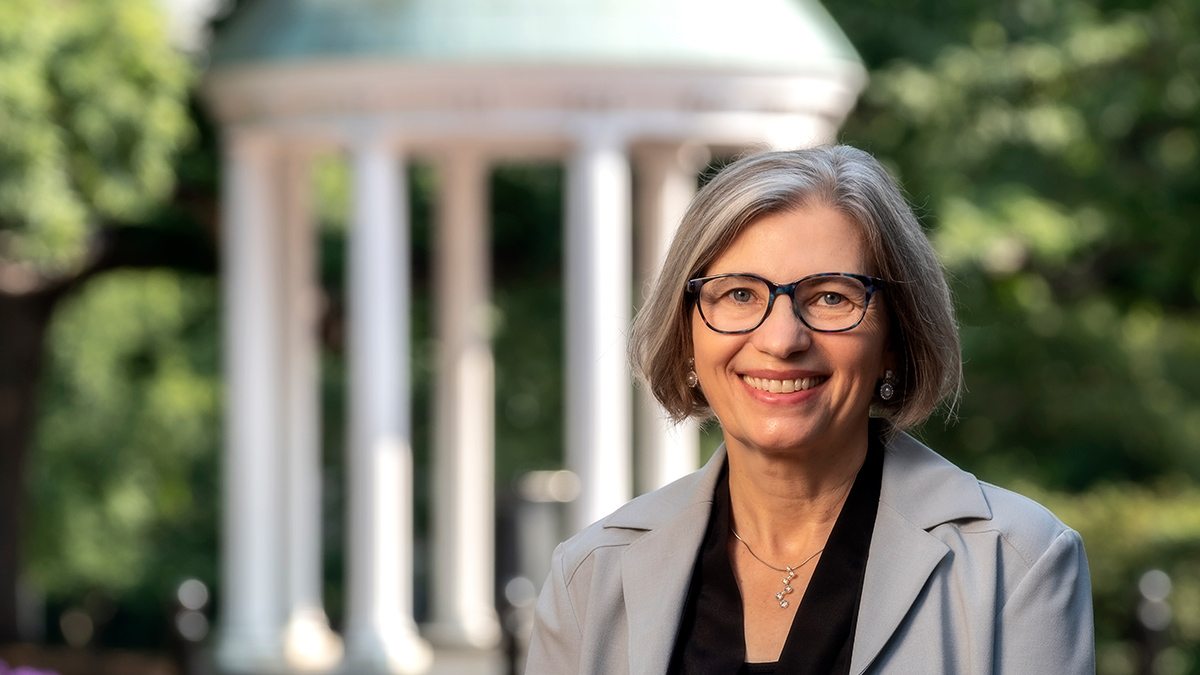Faculty secretary Jill Moore manages faculty governance, meetings
Working behind the scenes, the new secretary keeps everything running and enables the faculty chair to be the primary voice for the faculty.

Jill Moore has been an undergraduate student, graduate student, staff member, law student and faculty member at Carolina, in that order. Two months ago, she added secretary of the faculty.
Elected by Faculty Council in April, she is the first woman to serve in that role. She takes over for Vin Steponaitis, professor of archaeology and anthropology in the College of Arts & Sciences, who served since 2016 and stepped down on July 1. Moore’s first Faculty Council meeting as secretary was a rare summer meeting held on July 14. The Council’s first regular meeting of the academic year was Sept. 3.
Moore is an associate professor of public law and government in the UNC School of Government. An expert in public health law, she has a special interest in North Carolina communicable disease law. She has worked closely with local health departments and state public health officials on a variety of issues for the last 18 months during the pandemic.
The Well recently spoke to Moore about her role as secretary.
What are your responsibilities as secretary of the faculty?
There are two parts of this role: As secretary of the faculty, I have certain duties associated with keeping the wheels of faculty governance turning and making sure that they stay on the road. That includes Faculty Council, the Faculty Executive Committee and 26 other standing committees that work on issues ranging from developing plans for educational policy to looking at research to dealing with individual faculty issues through a grievance process. The secretary is responsible for assuring that those committees are convened, that they’re staffed and the members know what their charges are so that work can be done.
I’m also the director of the Office of Faculty Governance, which is more of an administrative role. We have a staff that helps provide support for the committees.
When Faculty Council is meeting, I serve as parliamentarian, following Robert’s Rules of Order to make sure voting and procedural processes go the way they’re supposed to go.
The secretary role is distinct from the faculty chair, who is the primary voice for the faculty. The committees are also a part of expressing that voice in our shared governance structure. The secretary of the faculty is the behind-the-scenes person who keeps everything running so that the voice of the faculty is expressed.
What is faculty governance and what role does it play at the University?
We have a history of shared governance at Carolina that goes back to when the University first opened. The faculty has always played a role in the governance, and it’s evolved over time.
In the early days, the faculty were extremely involved not only in setting the direction for the curriculum of the University, but they even got involved in the day-to-day disciplining of students. In the more modern view, faculty governance is still responsible for setting educational policy for the University and maintaining the faculty code of University government, but we also provide a structure for the faculty to be heard on a wide variety of issues affecting our University community.
How did your background and your work at the School of Government prepare you for this role?
I’ve spent most of my career working at the School of Government, where we have a nonpartisan and nonadvocacy orientation to how we have approached things.
I have over 20 years of experience helping deliberative bodies in North Carolina reach their own best decisions within the bounds of their charge. I’m comfortable being in the more neutral kind of role where I make sure that we’re following procedures and that people are being heard. I think that translates quite well to Office the Faculty Governance.
Have you been involved in faculty governance before?
I’ve been a UNC faculty member since 1997, and I got involved in my first three to four years. I served on several different committees and Faculty Council. In fact, I was a Faculty Council member when I was elected secretary, so I had to step down from that role.
Why did you want to be secretary of the faculty?
It’s a combination of natural interests and what I perceive to be my own skills. I’ve always been interested in legislation, so working with the faculty code actually energizes me. I have a strong interest in all the different things that are going on at the University. And faculty governance is nicely situated at the center of a lot of the different activities, including involvement with undergraduate education. I also have a service orientation toward the University.
Joe Ferrell, a fellow faculty member at the School of Government, also served as secretary of the faculty. He was very good about making sure that those of us at the school got involved in faculty governance.
During the pandemic, Faculty Council worked closely with Employee Forum on issues that affect the campus. What are some ways that’s been successful? Do you see that collaboration continuing?
I hope the collaboration will continue. We have our different roles, but we’re one campus community. The decisions that we make affect each other. I think an important part of shared governance is that the staff have a voice. I think it’s got the built-in seeds of success when these different groups are getting together, listening to each other and valuing each other’s roles and what they have to say.




